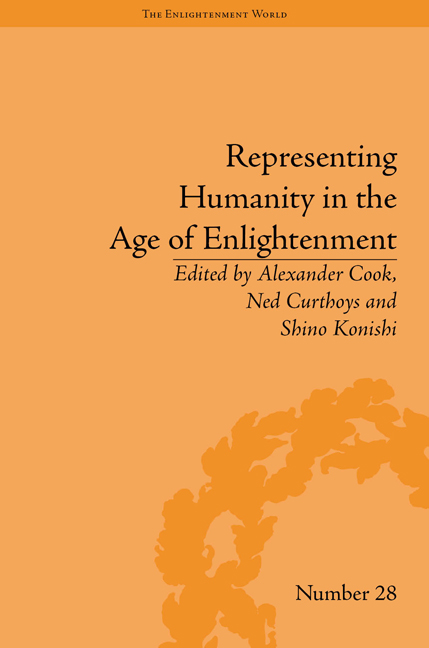Book contents
- Frontmatter
- CONTENTS
- Acknowledgements
- Dedication
- List of Contributors
- List of Figures
- The Science and Politics of Humanity in the Eighteenth Century: An Introduction
- Part I Humanity and the Civilizing Process
- Part II Encountering Humanity
- 6 Songs from the Edge of the World: Enlightenment Perceptions of Khoikhoi and Bushmen Music
- 7 Joshua Reynolds and the Problem of Human Difference
- 8 François Péron's Meditation on Death, Humanity and Savage Society
- 9 Neither Civilized Nor Savage: The Aborigines of Colonial Port Jackson, Through French Eyes, 1802
- 10 The Difficulty of becoming a Civilized Human: Orientalism, Gender and Sociability in Montesquieu's Persian Letters
- Part III The Limits of Humanity
- Notes
- Index
9 - Neither Civilized Nor Savage: The Aborigines of Colonial Port Jackson, Through French Eyes, 1802
from Part II - Encountering Humanity
- Frontmatter
- CONTENTS
- Acknowledgements
- Dedication
- List of Contributors
- List of Figures
- The Science and Politics of Humanity in the Eighteenth Century: An Introduction
- Part I Humanity and the Civilizing Process
- Part II Encountering Humanity
- 6 Songs from the Edge of the World: Enlightenment Perceptions of Khoikhoi and Bushmen Music
- 7 Joshua Reynolds and the Problem of Human Difference
- 8 François Péron's Meditation on Death, Humanity and Savage Society
- 9 Neither Civilized Nor Savage: The Aborigines of Colonial Port Jackson, Through French Eyes, 1802
- 10 The Difficulty of becoming a Civilized Human: Orientalism, Gender and Sociability in Montesquieu's Persian Letters
- Part III The Limits of Humanity
- Notes
- Index
Summary
When they sailed through Sydney Heads in the early winter of 1802, Nicolas Baudin and his men entered upon an unscheduled sojourn that would present them with their most prolonged cross-cultural encounter of the voyage and their only opportunity to observe Aboriginal Australians in a colonial environment. In the nascent British penal colony of Port Jackson, it might be assumed that the Baudin expedition had found the ideal situation for addressing one of its most vital tasks: gathering ethnographical data to advance understandings of the nature of Man. However, there are differences in the tone and extent of their records about Port Jackson's Aboriginal people which suggest that the Frenchmen were either reluctant or found it difficult to conduct ethnographic work during these months in port. It is well-established, for instance, that they wrote far less on the original inhabitants of Port Jackson than on the colony itself, primarily its European inhabitants and the nature of its progress. What they did record about the Aboriginal people is brief and fragmented. There are bursts of detail, and sometimes insight; however, it is detail recorded at a distance – summaries and evaluations of characteristics generally observed, rather than descriptions of actual contact, of the gestures, words or gifts exchanged.
- Type
- Chapter
- Information
- Representing Humanity in the Age of Enlightenment , pp. 123 - 134Publisher: Pickering & ChattoFirst published in: 2014



